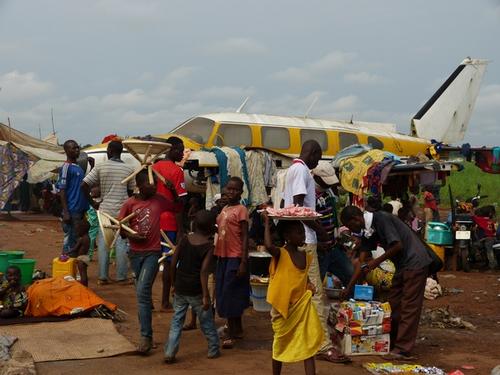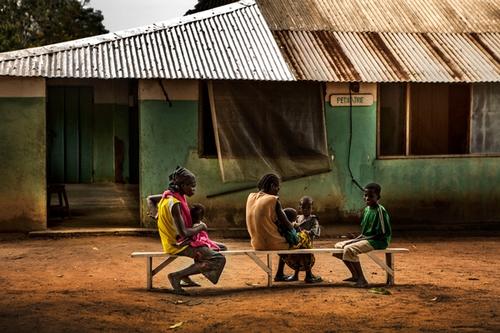There were no unseasonable cicadas buzzing or roosters crowing early that morning, there were no people hustling and bustling in the market or the streets. One could sense the reason why the routine of a sunny morning was being broken: the eerie noise of mortars.
The shuddering thunder of anti-aircraft guns and submachine guns went on non-stop in the distance until it died down around midday. From then on, gunshots and explosions in the distance filled the town’s soundscape with echoes and bad omens. While our doctors and nurses, seasoned MSF veterans, were giving their all on one of the most chaotic, bloodthirsty days they recall.
At the Hôpital Communautaire in Bangui, dozens of injured people crowded against the hospital gates, as weapons were cocked threateningly and the men brandishing them took injured ‘suspects’, despite the efforts of unarmed humanitarian workers putting their lives between the victims and their captors.
That afternoon in Bangui, it rained. And the rain soothed a little the concern in our bodies and spirits...perhaps naïvely. And I say naïvely because at that moment we were already fearing the worst, many of us had already begun to see that it could turn into the massacre it did become. Yet darkness feeds fear in Central African homes, an appalling fear that stirs things the same way a mere spark catches fire when in contact with fuel...

Following the days when violence had reached its peak, 40,000 people sought shelter at the airport in the capital of CAR.
We had seen it many times, but that night threatened to become even bloodier: we feared that armed men aligned with the Séléka coalition that had brought them to power, and who had taken arbitrary and baneful control over the town, would break loose, helped by the semi-darkness, and set off in retaliation for the morning attack, on a bloody chase of everyone suspected to be collaborating with the self-defence militia responsible for the fighting calling themselves Anti-Balaka (anti-machete).
The modus operandi consists of: combing entire neighbourhoods accused of complicity or cover-up; chasing the suspects house by house, door to door, and torturing and executing in cold blood each and every male between 15 and 40, the fittest to take up arms; burning down houses with entire families inside, and giving free rein to the vile rule of the machete and indiscriminate mutilation.
Rain started with a staccato rhythm, by early evening, when our medical teams should leave the hospitals for security reasons. The drizzle turned into a storm and reached allegro tempo in the next few hours, at dusk. In a somewhat naïve way, some were comforted by the thought that the rain would appease the thirst for revenge. Others, seeing the pale faces of their colleagues, who had spent the day fighting against the havoc wrought by war in the operating theatres, did not have very high hopes.
We tried to get some sleep and get ready for our second day in the hell we already knew would break loose from the next day on.
Some time later I woke up with a start: thunder was sounding really close. I lay down on the bed again and decided to let myself be lulled by the litany of rain. However, little by little, the sleepiness I still felt turned into a much more unpleasant restlessness, as it grasped my very heart: there was a moment when the faraway thunder started mixing with the sound of heavy artillery shelling, while the patter of the raindrops blended with the rattle of submachine gun fire.



